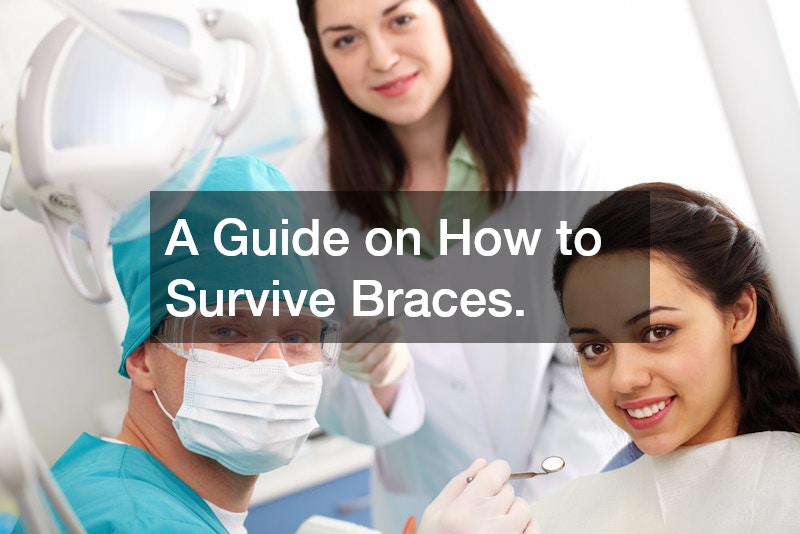A Guide on How to Survive Braces.
Getting braces can feel like stepping into a new world full of adjustments, restrictions, and self-conscious smiles. Whether you are just beginning your orthodontic journey or are deep into it, surviving braces is all about knowing what to expect, maintaining proper care, and having the right mindset. Your orthodontist plays a huge role in making the experience smoother, but what you do each day determines how comfortable and successful your treatment will be.
1. The First Few Days: Adjusting to Life with Braces
The first few days after getting braces are often the hardest.
Your mouth will feel tender, your teeth may ache, and even speaking or eating might feel strange. This discomfort is normal as your teeth begin to shift. During this time, soft foods are your best friends. Stick to things like mashed potatoes, yogurt, soup, smoothies, and scrambled eggs. Avoid biting into anything hard or sticky, as it can cause pain or even damage your brackets.
Using orthodontic wax is another key trick to surviving the adjustment phase. If a bracket or wire rubs against your cheek or lips, apply a small ball of wax over the area to prevent irritation. Over-the-counter pain relievers can also help ease soreness during the first few days.
2. Eating Smart: What You Can and Cannot Eat
Braces and certain foods simply do not mix. Hard, sticky, crunchy, and chewy foods can cause wires to bend or brackets to pop off. Avoid foods like caramel, popcorn, gum, and nuts. Even biting into an apple or corn on the cob can be risky — cut them into smaller pieces first.
Instead, focus on braces-friendly foods that are soft and easy to chew. Pasta, rice, steamed vegetables, soft bread, and boneless meats are great options. If you have a sweet tooth, go for puddings or milkshakes rather than hard candies or chewy sweets. Your orthodontist will usually give you a list of foods to avoid, but being mindful every time you eat will prevent unexpected trips to the clinic.
3. Keeping Your Braces Clean
Brushing and flossing become much more important once you have braces. Food can easily get trapped around the brackets and wires, leading to plaque buildup and staining if not cleaned properly. Use a soft-bristled toothbrush and fluoride toothpaste, and brush after every meal if possible. Spend extra time brushing around each bracket and along the gumline.
Flossing can be tricky, but tools like floss threaders or orthodontic flossers make it easier to get between teeth. Water flossers are also a great investment for anyone with braces. They help remove debris from areas that regular brushing might miss and can keep your mouth feeling fresh.
A clean mouth not only keeps your teeth healthy but also makes your orthodontic visits easier. If your orthodontist notices plaque buildup or gum irritation, they may need to slow down your adjustments, which could extend your treatment time.
4. Handling Discomfort and Emergencies
It is normal for your mouth to feel sore after each tightening or adjustment appointment. That means your teeth are moving as intended. Over-the-counter pain relief, warm saltwater rinses, and soft foods can help with the discomfort.
If a wire pokes your cheek or gum, try gently bending it back with a clean pencil eraser or cover it with orthodontic wax until you can visit your orthodontist. Never attempt to cut or pull out wires yourself — that can lead to injury or worsen the issue. If a bracket comes loose, contact your orthodontist as soon as possible. Do not try to glue or fix it on your own.
5. Staying Motivated During Treatment
Braces can feel like a long journey, especially when you are wearing them for a year or more. It is easy to get frustrated or self-conscious, but remember — this is a temporary phase with lifelong results. Every time you feel discouraged, think about how great your smile will look when the braces come off.
Taking pictures along the way can also help you see progress. Even small changes in your bite or alignment show that the process is working. Keeping up with appointments and following all your orthodontist’s advice will make your treatment more efficient and could even shorten the time you need to wear braces.
6. Protecting Your Braces During Activities
If you play sports, always wear a mouthguard. A direct hit to the mouth can cause serious damage to both your braces and your teeth. Your orthodontist can provide a custom mouthguard that fits over your braces comfortably. Even if you are not in contact sports, using a mouthguard can be helpful during physical activities to prevent accidental injuries.
7. Aftercare: When the Braces Come Off
The day your braces come off is one of the best feelings in the world — but your orthodontic journey is not quite over. After braces, you will likely receive a retainer to help keep your teeth in their new positions. Wearing it as directed by your orthodontist is essential to prevent your teeth from shifting back. Clean your retainer daily and store it properly to avoid loss or damage.
Continue to brush and floss carefully, and visit your dentist for regular cleanings. It may take a few weeks for your gums and bite to fully adjust after the braces are removed, but soon you will have the confident smile you worked for.
8. Final Thoughts: Embrace the Process
Surviving braces is all about patience, discipline, and self-care. The first few weeks might be uncomfortable, but every small effort you make — from avoiding sticky foods to keeping your braces clean — brings you one step closer to a perfect smile. Your orthodontist will guide you through the process, but your daily routine determines how successful your treatment will be.
Remember, braces are temporary, but a healthy, aligned smile lasts a lifetime. So follow the rules, stay positive, and trust the process.




